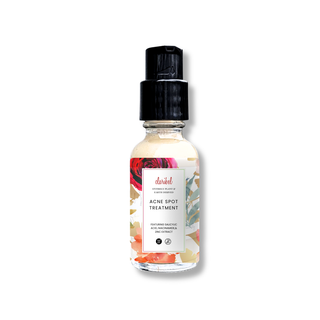
Discover the Best Oil for Your Skin: An Expert Guide
It's no surprise that oil has been used in skin care for centuries. Ancient cultures used it to protect and nourish their skin, and it's still one of the most popular skin care ingredients today. But with so many different oils available, it can be difficult to figure out which one is best for your skin type. That's why we've created this guide to help you discover the best oil for your skin.
We'll start by exploring the benefits of using oils for skin care and then discuss the different types of oils available. Then, we'll look at how to choose the best oil for your skin type and how to use oils for skin care.
Finally, we'll provide some tips for using oils for skin care. By the end of this guide, you'll have a better understanding of which oil is right for you. So, let's get started.
Our Hyaluronic & Multi Peptide Serum include some exclusive and clinically proven skin friendly oils to treat your skin, and ships for free in the US.
What is the Best Oil for Your Skin?
When it comes to skin care, there is no one-size-fits-all oil. Different oils have different properties that make them better suited for certain skin types. Some oils are better for dry skin, while others are better for oily or combination skin. It's important to do your research and find the oil that works best for your particular skin type.
The best oil for your skin will depend on a few factors, such as your skin type, your skin concerns, and your budget. If you have dry skin, you'll want to look for an oil that is rich in fatty acids and antioxidants to help keep your skin hydrated and nourished. If you have oily or combination skin, you'll want to look for an oil that is lightweight and non-comedogenic, meaning that it won't clog your pores.
No matter your skin type, you should look for a high-quality oil that is cold-pressed and organic. Cold-pressed oils retain more of their natural nutrients, which can be beneficial for your skin. Organic oils are free of synthetic ingredients, which can be irritating to the skin.

Benefits of Using Oils for Skin Care
Using oils for skin care can be incredibly beneficial for your skin. Oils are packed with antioxidants, vitamins, and fatty acids that can help protect and nourish your skin. They can help keep your skin hydrated and restore its natural balance.
Oils can also help protect your skin from environmental stressors, such as pollution and UV rays. They help form a protective barrier on your skin that can help keep out harmful particles and keep your skin looking healthy and radiant.
In addition to these benefits, oils can also help reduce the appearance of wrinkles and fine lines. Many oils are rich in antioxidants that can help protect your skin from free radical damage and reduce the appearance of wrinkles. Oils can also help even out your skin tone and texture and make your skin look glowing and youthful.
Different Types of Oils for Skin
There are many different types of oils available for skin care, each with its own unique benefits. Let's take a look at some of the most popular oils and what makes them special.
Jojoba Oil
Jojoba oil is a popular choice for skin care because it is similar to the natural oils produced by our skin. It is rich in fatty acids and antioxidants, making it great for dry and combination skin. It helps keep your skin hydrated and can help reduce the appearance of wrinkles and fine lines.
Coconut Oil
Coconut oil is another popular oil for skin care. It is rich in fatty acids and vitamins and can help keep your skin hydrated and nourished. It can also help protect your skin from environmental stressors and reduce the appearance of wrinkles and fine lines.
Argan Oil
Argan oil is a luxurious oil that is rich in fatty acids and antioxidants. It helps keep your skin hydrated and can help reduce inflammation and redness. It is also great for reducing the appearance of wrinkles and fine lines.
Sweet Almond Oil
Sweet almond oil is a lightweight oil that is rich in fatty acids and vitamins. It helps keep your skin hydrated and can help reduce inflammation and redness. It is also great for reducing the appearance of wrinkles and fine lines.
Avocado Oil
Avocado oil is a rich and nourishing oil that is packed with fatty acids and antioxidants. It helps keep your skin hydrated and can help reduce inflammation and redness. It is also great for reducing the appearance of wrinkles and fine lines.
Rosehip Oil
Rosehip oil is a luxurious oil that is rich in fatty acids and vitamins. It helps keep your skin hydrated and can help reduce inflammation and redness. It is also great for reducing the appearance of wrinkles and fine lines.
Our Hyaluronic & Multi Peptide Serum include some exclusive and clinically proven skin friendly oils to treat your skin, and ships for free in the US.
How to Choose the Best Oil for Your Skin Type
Now that you know the different types of oils available, it's time to figure out which one is best for your skin type. The best oil for your skin type will depend on a few factors, such as your skin type, your skin concerns, and your budget.
If you have dry skin, you'll want to look for an oil that is rich in fatty acids and antioxidants, such as jojoba oil, coconut oil, argan oil, sweet almond oil, or avocado oil. These oils will help keep your skin hydrated and nourished.
If you have oily or combination skin, you'll want to look for an oil that is lightweight and non-comedogenic, such as coconut oil or rosehip oil. These oils will help keep your skin hydrated without clogging your pores.
No matter your skin type, you should look for a high-quality oil that is cold-pressed and organic. Cold-pressed oils retain more of their natural nutrients, which can be beneficial for your skin. Organic oils are free of synthetic ingredients, which can be irritating to the skin.
How to Use Oils for Skin Care
Using oils for skin care is easy and can be incredibly beneficial for your skin. The best way to use oils for skin care is to apply them directly to your skin after cleansing and toning.
To apply the oil, start by taking a few drops of oil onto your fingertips. Gently massage the oil into your skin, starting at your forehead and working your way down to your neck and chest. Make sure to avoid the eye area.
Once you've massaged the oil into your skin, you can leave it on overnight or rinse it off after 15-20 minutes. If you're using a heavier oil, such as jojoba oil or avocado oil, you can use it as a moisturizer. Just apply it to your skin after cleansing and toning and leave it on overnight.
Tips for Using Oils for Skin Care
Now that you know how to use oils for skin care, here are a few tips to make sure you get the most out of your oil:
- Start with a small amount - You don't need to use a lot of oil for it to be effective. Start with a small amount and increase it as needed.
- Consider which oils you're mixing if you're going to - Different oils have different properties, so it's best to put some thought into how you might mix them. Start with a small amount of your mixture to make sure it's a good choice for your skin.
- Use it regularly - For best results, use your oil on a regular basis. This will help keep your skin hydrated and nourished.
- Be gentle - Don't scrub your skin when applying the oil. Gently massage it into your skin, using circular motions.
Our Hyaluronic & Multi Peptide Serum include some exclusive and clinically proven skin friendly oils to treat your skin, and ships for free in the US:
Conclusion
Now that you know the best oil for your skin type and how to use it, you're ready to start incorporating oils into your skin care routine. Oils can be incredibly beneficial for your skin, helping to keep it hydrated, nourished, and protected. So, don't be afraid to give oils a try! You may be surprised at how much healthier and radiant your skin looks. Our Vitamin C Antioxidant Facial Oil is the perfect combination of oils for all skin types. We guarantee you'll love it.





